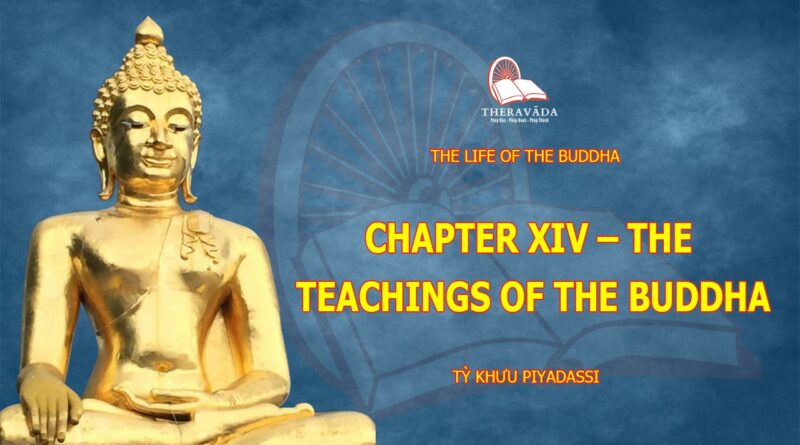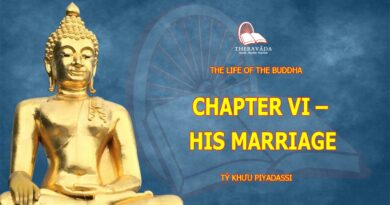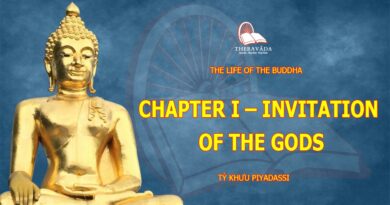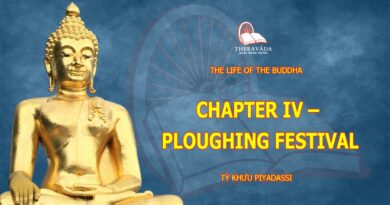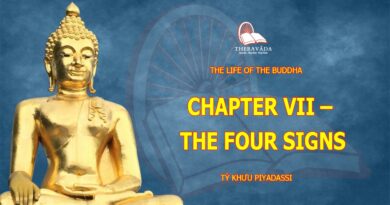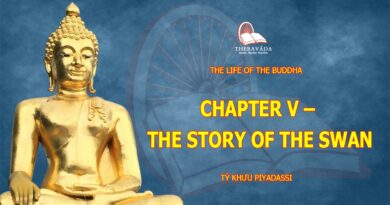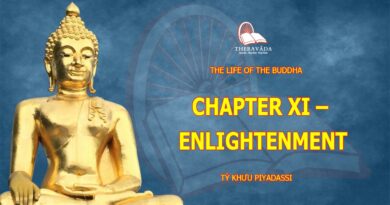THE LIFE OF THE BUDDHA: CHAPTER XIV – THE TEACHINGS OF THE BUDDHA
During the next forty-five years the Buddha preached His new-found knowledge to help mankind and the Devas. He was known as Satthaa Devamanussaanam – teacher of Devas and humans. Some special features of the teachings of the Buddha are as follows:
- The Buddha wanted us to study, investigate and understand His teachings, only accepting them when we found them to be moral and conducive to the well-being and happiness of mankind. The Buddha said, “Do not accept anything on mere hearsay, tradition, rumours, inference, preconceived notions, supposition, or because it seems acceptable. Do not accept anything because the ascetic who taught it is respected by all …”.
Buddhism appeals more to the intellect than the emotion. It is concerned more with the character of the devotees than with their numerical strength. When the millionaire Upaali visited the Buddha with the idea of condemning His teachings, the Buddha patiently taught him the Dhamma. Impressed with His teachings, Upaali wished to join His followers. However, the Lord Buddha advised him saying, “It is well for a distinguished man like you to make a thorough investigation.” Upaali, overwhelmed with joy at this unexpected statement said, “If I had become a follower of any other teacher they would have proclaimed the fact that I, Upaali the millionaire, had changed teachers. The more pleased am I.” Upaali became a Buddhist by conviction but the Buddha with His boundless compassion advised him to support his former religious teacher as before.
- The Buddha advised us that at no time should we ever insult or condemn the religion of another. Intolerance is the greatest enemy of religion. Denouncing unfair criticism of other faiths the Buddha states, “It is as a man who looks up and spits at heaven. The spittle does not soil the heaven, but comes back and soils his own person.” On another occasion the Buddha said, “If you find truth in any religion, accept that truth.”
- The ordinary precepts that Buddhists follow are not commandments but modes of discipline (sikkhaapada) that they take of their own accord. In Buddhism we are not forced or commanded to do anything. We follow the teachings of the Buddha of our own free will because we understand and believe in them.
- Buddhism teaches non-violence. In the Dhammapada (Law Verses) the Buddha said:
“All fear the rod,
Life is dear to all.
Feeling for others as for yourself
You should neither slay,
Nor cause others to slay.”
Following, understanding and accepting the teachings of the Buddha, Buddhists take the first precept ‘paanaatipaataa veramani sikkhaapadam samaadiyaami’ which means ‘I undertake to observe the precept of abstaining from destroying living beings’.
To the unique credit of Buddhism, it must be said that throughout the peaceful march of 2600 years, no drop of blood has been shed in the name of the Buddha, and no mighty monarch has wielded his powerful sword to spread the Dhamma.
- The Buddha taught us to be compassionate to all living beings. In the Karaniya Metta Sutta the Buddha said:
“As a mother protects her only child,
Even at the risk of her own life,
Let one cultivate boundless thoughts of loving kindness.
Towards all living beings.”
- The Buddha taught us that we must show love and kindness to our enemies and those we do not like. He did not believe in revenge and an eye for an eye. In the Dhammapada the Buddha said:
“Conquer anger by loving kindness.
Conquer evil by good.
Conquer the stingy by liberality.
Conquer the liar by truthfulness.”
- The Buddha advocated equality for all mankind. He attempted to abolish slavery and the degrading caste system in Indian society. He declared:
“By birth is not one an outcaste,
By birth is not one a brahmin.
By deeds is one an outcaste,
By deeds is one a brahmin (1).”
According to the Buddha’s teaching, caste or colour do not prevent one from becoming a Buddhist or joining the order of the Sangha (Buddhist monks). Fishermen and scavengers, together with warriors and brahmins were freely admitted to the order of the Sangha and given positions of high rank.
Upaali the barber was chief disciple in matters pertaining to the discipline of the Sangha (Vinaya). Sunita, who was honoured by kings as an Arahanth (2), was a scavenger. Rajjumala and Punnaa were slave girls.
- The Buddha also raised the status of women by starting the order of the Nuns. He saw the good in both men and women. Gender is no barrier to spiritual development and religious service. At that time in Indian society women were often treated as inferior to men. When Queen Mallikaa gave birth to a baby girl, the Buddha comforted the distraught King Pasenadi by saying,
“A female child may prove even better than a male offspring.”
- Rebirth and kamma are also integral parts of Buddhism. According to the teachings of the Buddha, life does not end at death. One is reborn instantaneously. Though many great teachers of the East advocate rebirth, it is not a belief exclusively for the East. Many great men in the West believe in rebirth. Among its advocates we have scientists like Thomas Huxley, who was responsible for introducing science to the 19th century British school system, Professor Gustaf Stromberg, the famous Swedish astronomer, Professor Julian Huxley, the distinguished British scientist, philosophers like Pythagoras and Plato, poets like Shelley, Tennyson and Wordsworth, and American industrialist Henry Ford.
Our life is a result of our kamma. We are not brought to this world by anyone but ourselves. It is the result of a cause. The cause is delusion (avijja). To understand this theory, we need to develop our minds through meditation.
Kamma means action. Vipaka means results. Good actions cause good results. Bad actions cause bad results. The Buddha said, “Whether you are in the sea, the air, or in a cave, you cannot hide from the effects of your bad kamma.” That is the Law of Kamma. It must be stressed, however, that it is the intention behind the action and not just the action alone that sets off the reaction (vipaka). As Buddhists we refrain from bad actions and perform good actions because we know that one day, either in this birth or in a future birth, the effects of our actions will come back to us. We know that not even the Buddha can save us from the effects of our bad actions.
As Buddhists, we understand that due to the Law of Kamma, bad things can happen to a good person just as good things can happen to a bad person. We see the bigger picture. We go back into our past lives and understand that these are the results of our past bad actions. As such, we do not blame any divine powers for our misfortunes. Knowing that we are now paying for the results of our past bad actions, we take heed and ensure that we improve and not make the same mistake again. We learn from our misfortunes by doing good and avoiding bad actions.
- The Buddha taught us that you are your own saviour. No all-powerful God can help us to attain Nibbaana. No God can help us to escape from the effects of our own actions. As such, you make your own destiny. Mind is supreme. In Buddhism we learn to control our minds and our destiny. We rely on no one but ourselves. The Buddhas show us how. They are our teachers. It is up to us to follow Their teachings of the Noble Eightfold Path, to control and purify our minds through meditation and attain our own salvation. The teachings of all Buddhas can be summed up in three lines:
“Do no evil, Do good, Purify the mind.”
(1). Vasala sutta
(2). Arahanth – One who has attained Nibbaana
Source: Budsas.net

